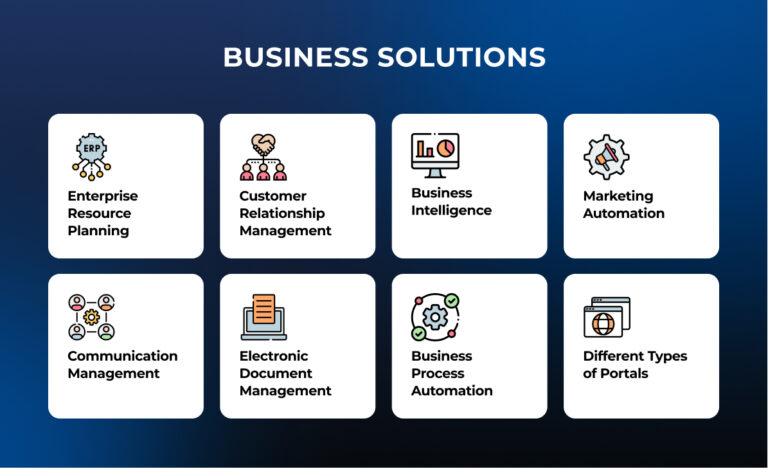Nowadays, every business seeks its own ways and approaches to deliver the most value and operate at its maximum capacity. Companies have their specific needs, and catering to them might be a challenge. However, choosing and creating the right solutions will be key to optimizing business processes and enhancing the efficiency of the whole organization.
So, what role do business solutions play here? We hear this term quite often in the business environment, but how well do we really understand their impact on business outcomes? In this article, we will explain why businesses need to use customized business solutions.

What is a Business Solution?
According to Gartner, a solution is an implementation of people, processes, information, and technologies in a distinct system to support a set of business or technical capabilities that solve one or more business problems.
The most common solutions are directly connected to the software and its capacities, as the majority of solutions are implemented with the help of specific software pieces that help organisations get closer to their goals and objectives.
Usually, a great solution goes beyond the basic functionality services companies might offer you. Created from different software units, a custom solution automates and integrates different business processes and caters to the needs and requirements of your company.
The more resources you are ready to invest into solution customization, the higher the value and higher efficiency it might deliver.
The True Value Behind Business Solutions
So, why have software solutions become so popular that businesses are ready to invest thousands of dollars into their development and implementation? The truth is that great business software, even the one that costs a fortune, will not only be recouped within a few years but will accelerate your processes and, in turn, will double or even triple your profits.
Such results are possible due to the next improvements the right software brings.
Enhanced Data Storage and Management
Data is a basis for any operations and processes organizations have. Data is essential, and the quality of its management will determine if you maximize its potential or, vice versa, create additional problems for your company.
Streamlining data management will help you eliminate mistakes you might make manually and speed up data processing, which will improve your throughput capacities. At the same time, you will ensure that your data is stored and available for use at any moment you might need it.
Moreover, quality data management will allow you to implement more advanced tools, e.g., predictive analytics.

Standardized and Streamlined Processes
Automation is one of the biggest benefits you might gain. Standardized, automated processes allow your employees to delegate a large number of operational tasks to the software. This means several great things for your team.
Firstly, your employees get more time for creative tasks where they can use their expertise and experience for strategic purposes and focus on clients and communications instead of some mundane processes. Your business uses employee potential in a more efficient way, while the employees have a chance to get more fulfillment from their work.
Secondly, automation implies standardization, which leads to transparency, accountability, and traceability of action. It enhances the velocity of the operation, reduces errors, and ensures that the same processes are done the same way.
Improved Data Security
Today, customers trust corporations with big volumes of their personal data. Any company is now responsible not only for the protection of their business data and trade secrets but for the data they have requested from customers. In the case of data leaks, companies risk going through serious litigation and reputation losses.
Having all data managed by the unified software solution helps to get a better hold over sensitive information and, hence, protects it more efficiently when the data is scattered over dozens of spreadsheets or employee devices.
Optimized Expenses
Reduced costs come from previous points: automation, standardization, and transparency decrease expenses, as the processes, work more smoothly, the possibility of disruptions declines as well, and businesses receive funds they can redirect to improving customer services or business scaling.

Types of Business Solutions
The number of possible solutions is impressive, as almost every business process can become stronger with the help of relevant software.
The most common software solutions companies adopt include:

Ready-Made vs Custom Solutions
When a company wants to adopt new software, there is always a choice between implementing a ready-made SaaS system and developing a custom solution. So, let’s compare the pros and cons of each option.
Customization
Ready-made: Unfortunately, for ready-made software, customization isn’t usually its strongest side. Some providers might offer some options for customization, for example, implementing additional modules to a basic package, but you are still limited to the settings and flows the solution offers.
Custom: Of course, the solution you develop from scratch can be customized as much as you want. From the beginning, its architecture flows and interfaces are tailored to the requirements of your team.
Scalability & Flexibility
Ready-made: It would be pretty hard to scale a ready-made solution. In this case, you are relying heavily on the provider. Hence, the capacity of your software to scale depends on the provider, and they might not be ready to support such changes.
Custom: As you are the one who has full control over the solution, you can decide to scale or upgrade software, and your decision won’t depend on the capacities or approaches of the third-party providers who have their own interests that might not line up with yours.
Implementation
Ready-made: The time required for ready-made software implementation might vary depending on its difficulty and customization options, but it won’t take so much time that you will experience any disruptions or difficulties. Basically, you just need to buy one of the packages the provider offers, sometimes you also need the help of an implementation specialist, and you access a system that is ready to operate.
Custom: With a custom solution, you definitely need to have patience. The process of custom software development might take months, so you need to understand that the launch of the system will happen long after you initiate the development.
Price
Ready-made: Usually, the ready-made solution works under a monthly fee. Sometimes, some solutions might charge you for each user that uses the solution on a monthly or yearly basis. So, you should be ready to dedicate a part of the budget to the regular fees you will need to pay while you use any SaaS solution.
Custom: With custom development, you will need to invest a certain sum in its development. The price will depend a lot on the software scope and difficulty. When you see the number for the first time, you might perceive it as a huge investment, and it is true. However, try to approach this issue from another angle: custom software will be in your use for years, while, on average, it takes two-three years to recoup its cost.

Count up how much it is going to cost you to pay monthly for a ready-made solution: it is quite possible that the prices might line up. However, the value of a custom solution might be much bigger than that of a ready-made one.
We won’t say that custom solutions are a better choice in 100% of cases. The truth is that for small businesses, it might be unwise to develop a custom solution when they can save money by implementing ready-made software here and now. However, as the business capacities grow and the company reaches a bigger and bigger market share, the software should be tailored to cater to these changes, and a custom solution will be exactly for this task.
In Conclusion
Software business solutions are strong instruments from which any company can benefit. Approach the question of their implementation wisely, and you will be able to enhance the efficiency of your team and access an even higher value than you do know.
FAQ
The main purpose of any business solution is to solve a certain business problem.
Business solution requirements are the specific conditions or goals that need to be met in order to resolve a problem or achieve a business objective. These requirements guide the design and execution of the solution, ensuring it aligns with company needs.
A business solutions project is an organized effort to develop and implement a solution to a business problem. It includes planning, execution, and review, with clear objectives to ensure the solution effectively meets the identified need.
The role of business solutions is to help companies address challenges, improve processes, and reach goals more effectively. Business solutions aim to increase efficiency, enhance decision-making, and drive growth by solving problems or optimizing operations.
An example of a business solution is implementing new software to automate inventory management. This would help a company reduce human error, speed up processes, and improve accuracy.
The purpose of a business solution is to address challenges that hinder business performance. By solving problems or improving processes, it helps the company work more efficiently, reduce costs, and increase profitability.
Creating a business solution involves understanding the problem, gathering data, and identifying potential strategies or valuable tool that can solve the issue. After evaluating options, you select the best solution, plan its implementation, and track its success.
To propose a business solution, first, clearly define the problem and its impact on the company. Then, outline the solution and explain how it will address the problem. Provide evidence or examples to support its effectiveness and present a plan for implementation.
The most optimal way to do this will be to cooperate with a software development vendor who will guide you through the process of solution conceptualization, development, and implementation.






